Assessments are among the first steps in your rehabilitation journey with PCVRS. After you meet your Rehabilitation Service Specialist (RSS), get an overview of the program, you have the assessments to identify your needs. From these assessments, rehabilitation goals and required services are identified. If you have an eligible mental health problem, you may be referred to a mental health professional for a psychological assessment. In this blog, we explore psychological assessments, what happens during an assessment, and what they are used for.
Dr. Sylvie Bourgeois is the Medical Director of Psychology and Mental Health at PCVRS. We asked Dr. Bourgeois, a Ph.D. psychologist with nearly twenty years experience, why psychological assessments are so important.
“The rehabilitation focused psychological assessment, assesses the Participant’s current
ability regarding their activities of daily living, family life, and community. It focuses on
how the symptoms of eligible mental health problems impact everyday functioning. The psychological assessment aims to identify what types of psycho-social rehabilitation services may improve a Participant’s ability to function at home, in the community, and at work.”
Dr. Bourgeois explains that a psychological assessment can:
“The rehabilitation assessment process is designed to be participant-centered,” she adds. “It considers where the Participant is in their rehabilitation journey. Our Rehabilitation Service Professionals make sure Participants understand the intent and purpose of the assessment and are there to answer any questions.”

The psychological assessment is part of a step-by-step process. Here’s how it works:
1. Initial Consultation: You will meet with a psychologist or a member of the PCVRS mental health team to discuss your background, challenges, and goals. You’ll also review consent forms and talk about how PCVRS protects your privacy.
2. Assessment Activities: You may be asked to complete questionnaires, interviews, or activities. An assessment may take three or four hours but will vary depending on your needs. An assessment typically takes place over two sessions.
3. Feedback Session: A Rehabilitation Service Professional (RSP) will discuss the results of the assessment with you and explain how the Rehabilitation Service Specialist (RSS) will use the assessment results to determine which rehabilitation services may be included in your Rehabilitation Plan.
4. Rehabilitation Plan Created: The RSS will receive the assessment report and use it to determine if there are rehabilitation needs that should be addressed in a Rehabilitation Plan. If there are, they’ll work with you and your VAC Case Manager to create a Rehabilitation Plan with goals and milestones.
5. Collaborative Planning: Once the VAC Case Manager approves the Rehabilitation Plan, you will collaborate with your RSS, RSPs, and VAC Case Manager to meet your rehabilitation goals.
Starting a rehabilitation journey can bring a lot of questions. We’re here to help. Before each assessment, we provide an appointment package, so you know what to expect and how to prepare. Our goal is to make the process as smooth as possible.
At PCVRS, we are committed to providing supportive and effective rehabilitation services. Psychological assessments are a vital part of that commitment, helping us to identify your potential for improved functioning in everyday life, and support in the rehabilitation journey. We encourage you to ask your rehabilitation team if you have any questions about your rehabilitation journey.
Trauma-informed care is used to describe PCVRS’ approach when working with Veterans who have experienced trauma. PCVRS provides a Participant-centric approach that is culturally sensitive, respectful of diversity, and a trauma-informed. This approach isn’t just a rehabilitation model, it’s a philosophy of care that recognizes the unique experiences of Veterans and promotes a climate of collaboration, safety and empowerment. It aligns with our “Team around the Participant Approach” and how we work with you through every phase of your rehabilitation.
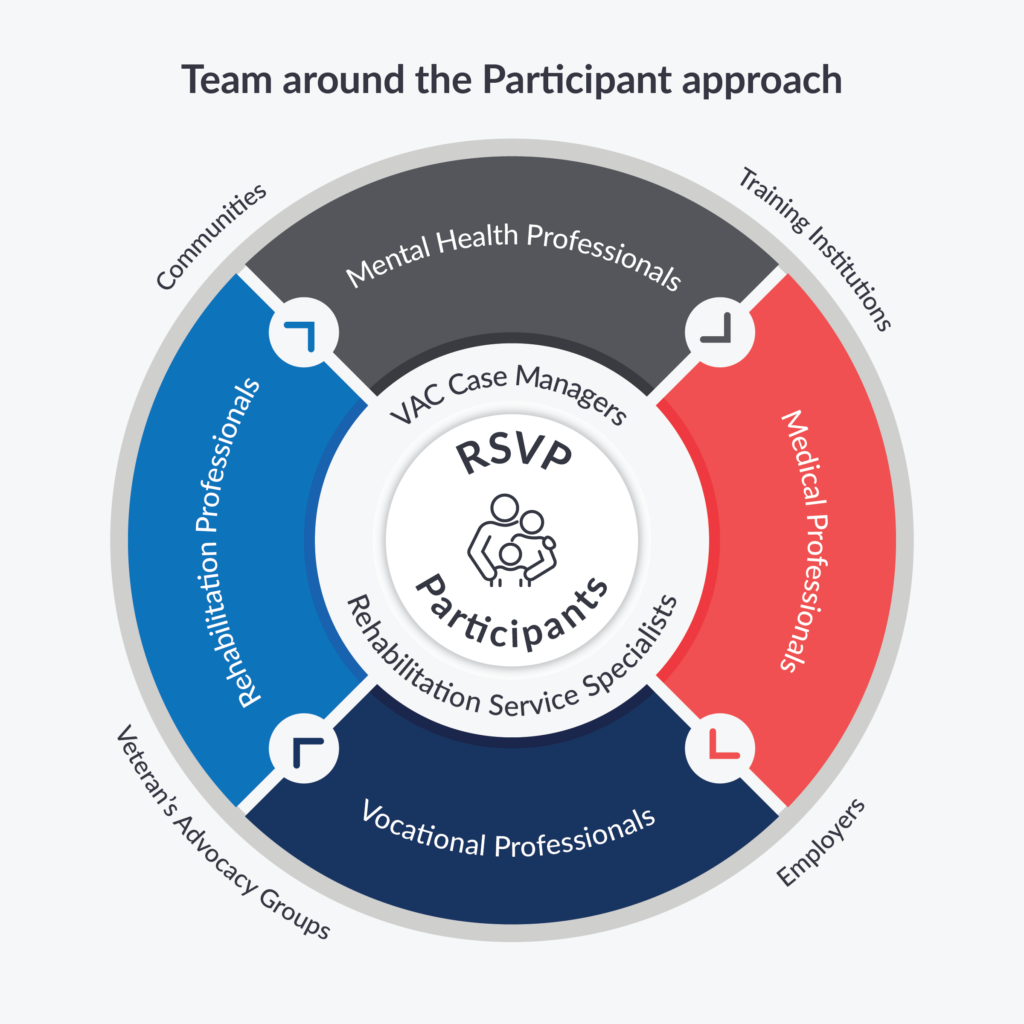
With PCVRS, the focus is on you, the Participant. Trauma-informed care ensures that our team of providers, your Rehabilitation Service Specialist (RSS) and your VAC Case Manager walk beside you, not just as the rehabilitation team, but as allies in your rehabilitation journey.
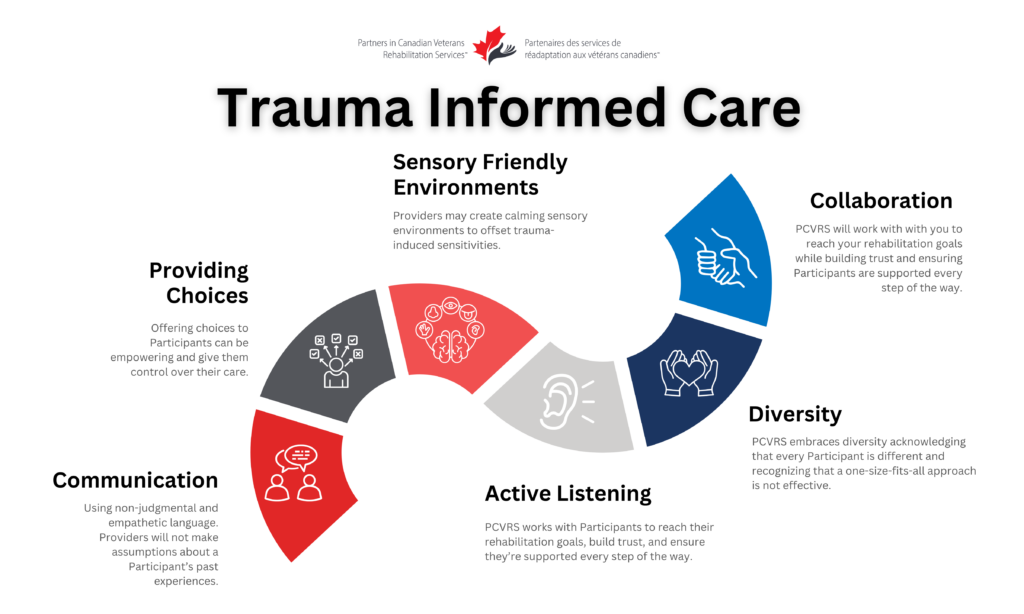
The trauma-informed model is evidence-informed and grounded in neuroscience, psychology, and Veteran-centred research. It enhances your rehabilitation journey by:
Rehabilitation is not a passive process:
At PCVRS, trauma-informed care is more than a best practice, it’s a commitment. A commitment to see you as a whole person. A commitment to provide care that is respectful and empowering.
Now, let us help support your rehabilitation, with care that understands where you’ve been and where you want to go.
Every stage of Veterans Affairs Canada's (VAC) Rehabilitation Services and Vocational Assistance Program (RSVP) is designed to help Participants achieve their rehabilitation goals. At Partners in Canadian Veterans Rehabilitation Services (PCVRS), we aim to improve rehabilitation outcomes by establishing realistic rehabilitation goals with the Participant that build on their abilities, interests, and strengths.
Every rehabilitation journey is unique, so the duration of a Rehabilitation Plan, the type of services recommended, and the number of sessions will vary based on individual needs. Some Participants may require in-clinic sessions, while others may benefit from a virtual setting and home exercise plan.
No matter what a Participant’s Rehabilitation Plan looks like, our focus is the continual improvement of their eligible health problem. We provide the support system necessary for Participants to focus on their medical, psychosocial and vocational rehabilitation goals.
PCVRS uses standardized reporting to measure and evaluate rehabilitation progress making sure Participants have the support they need to reach their rehabilitation goals. A Rehabilitation Plan is complete when a Participant achieves or mostly achieves their rehabilitation goals or no further improvement is anticipated. Participants have the opportunity to discuss their file with their Rehabilitation Service Specialist (RSS) and VAC Case Manager before it is closed.
PCVRS supports Participants’ rehabilitation needs and is dedicated to providing Participants with the resources they need when reaching the end of their Rehabilitation Plan. After a Participant’s Rehabilitation Plan is completed, they will continue to have access to a range of tools and resources on the PCVRS Participant Portal such as the Participant Training Centre. It provides access to a large catalogue of free, self-directed courses on professional and personal development topics and is available for up to one year after the Rehabilitation Program ends.
If a Participant needs ongoing treatment for chronic conditions or to maintain their current level of function, their VAC Case Manager can support them. If you are an RSVP Participant please speak to your VAC Case Manager to discuss additional services and benefits offered through VAC.
Vocational Rehabilitation helps to identify and achieve an appropriate occupational goal for a person, given their state of health and the extent of their education, skills and experience. Vocational intervention services with PCVRS aim to improve employability so the Participant can build the skills and confidence needed to find meaningful employment. Every Rehabilitation Services and Vocational Assistance Program (RSVP) Participant receives an initial vocational assessment by PCVRS to determine potential for employment.
Once all vocational assessments are complete, occupational goals will be identified. Vocational Rehabilitation goals focus on what the Participant needs to be employable, with consideration of their skills and abilities. This means identifying occupational goals that are comparable to their work experience, skills, and income, while ensuring that any health considerations are fully considered. Participants can work toward their vocational goals while receiving medical and psycho-social interventions.
Vocational interventions help RSVP Participants become employable in life after service. The Rehabilitation Service Specialist VOC (RSS - VOC) will work closely with program Participants to identify occupational goals that build on their education, skills, and experience while taking into consideration any limitations caused by their eligible health problems. Medical interventions to improve employability may include working with a Rehabilitation Service Professional to provide targeted support, such as improving fine motor coordination or memory training. Depending on the Participant’s needs and occupational goals, vocational interventions may include formal training or skills building, job search preparation and support, and active job search assistance, including job placement services.
If the Participant has a wide range of work and training experience acquired before, during or after their military career, the RSS-VOC may explore options that align with their experience.
There are several possible scenarios.
If the Participant has experience in the mechanical field but no longer has the ability to do physical work, supervisory or teaching roles in this field could be explored.
If the Participant started their military career at an early age and accumulated management experience, the RSS-VOC can help them identify positions with this type of responsibility, build a resume that accurately reflects their skills, and identify short training courses based on prior learning.
If time has passed since the Participant’s military career ended, and they have subsequently gained valuable experience , the RSS-VOC will look at the skills they have developed recently to identify the best strategy for a return to appropriate employment.
Depending on the Participants specific challenges, their interventions might include targeted therapy to improve cognitive skills for situational decision-making, or technology training to enhance computer skills.
Vocational Rehabilitation aims to enhance quality of life, addresses social determinants of health, and support financial independence through appropriate employment. . By engaging in vocational rehabilitation, Participants can gain confidence through community participation while improving emotional well-being. The PCVRS team supports Participant’s vocational rehabilitation every step of the way.
The goal of Veterans Affairs Canada’s (VAC’s) Rehabilitation Services and Vocational Assistance Program (RSVP) is to improve your life at home, in your community, and at work. To support you in reaching your rehabilitation goals, Partners in Canadian Veterans Rehabilitation Services (PCVRS) delivers rehabilitation services for a specific period of time based on your unique needs. Rehabilitation services address barriers that are impacting your re-establishment to life after service.
Intervention begins after your rehabilitation needs have been assessed and your Rehabilitation Plan has been developed. Your Rehabilitation Service Specialist (RSS) will coordinate rehabilitation services to meet your rehabilitation needs. These services will be specific to the rehabilitation goals that you have discussed with your RSS and VAC Case Manager and may include services provided by medical, psycho-social or vocational Rehabilitation Service Professionals (RSPs). Your rehabilitation services will be scheduled either in-person, virtually, or possibly a combination of the two, depending on your needs and the availability of the service.
During the Intervention Phase, your “Team” of RSPs as well as your RSS and VAC Case Manager will support you and your active participation in your Rehabilitation Plan. This includes preparing you for upcoming appointments, discussing your progress, and in some cases, adjusting your Rehabilitation Plan based on your needs.
Each Rehabilitation Plan is personalized and includes specific rehabilitation goals, called SMART goals defined as:
The goals in your Rehabilitation Plan are set to help you and your rehabilitation team monitor your progress, track your successes and make adjustments to support you in achieving your goals. This approach is supported by Veteran-focused research in the Journal of General Internal Medicine (2021) that assessed the complex needs of Veterans and recommended Participant-centered goals that focused on specific functional health outcomes.
Occupational Therapists (OTs) can help you overcome physical or mental health barriers that impact your ability to do the activities you want to do, need to do, or are expected to do in your daily life. OTs help you identify activities that are meaningful to you and break them down into smaller tasks to help you can gain independence.
For example, a Participant may experience social anxiety due to their PTSD resulting in them avoiding crowds or working in groups. OT services may be delivered to help the Participant achieve their goals by initially having them meeting in small, quiet environments then gradually increasing, over time, to larger, public spaces. By working with OTs Participants can also learn coping strategies such as breathing exercises or mindfulness techniques to help improve relaxation, concentration and attention span within these environments.
The Intervention Phase is where the rehabilitation work occurs and where you should start to see progress. Your hard work and dedication will set you up for success.
Embarking in therapy can be overwhelming. You may be wondering if your provider will be 'the right fit' or perhaps you may be apprehensive about sharing your story with someone new. But whatever the reason may be, it is important to understand these worries are experienced by many.
At Partners in Canadian Veterans Rehabilitation Services (PCVRS), we understand the journey towards healing is not linear and that every Veteran participating in the Rehabilitation Services and Vocational Assistance Program (RSVP) has unique needs. As such, our goal is to help Veterans feel safe and empowered to make informed decisions about their care. This blog post highlights the importance of collaboration by exploring therapeutic alliance - a partnership that starts with you.
Therapeutic alliance is the bond formed over time between the Provider and the Participant through open and honest experiences. This high-trust partnership can only be formed when both parties are fully invested and open to collaborating as a team. The Provider guides and supports the Participant through their rehabilitation journey, but the Participant is truly the agent of change. Rehabilitation takes time, effort and a genuine desire to see improvements over the course of the partnership. As such, both members have equal roles to play, so let's take a deeper dive to better understand these roles:
What to Expect from your Provider:
Rehabilitation Service Professionals (RSPs) are rehabilitation focused health professionals, such as occupational therapists, psychologists, physiotherapists, and more.
To provide you with the best advice and guidance possible, RSPs have the responsibility to foster a safe environment that allows for open discussions - you should feel comfortable sharing your goals and challenges. To make this possible, RSPs must bring their authentic selves when engaging with you. Together, you and your RSP will establish objectives and discuss where, when and how often you will be meeting. Additionally, you may discuss past experiences with similar providers. This will allow your RSP to understand what has and has not worked for you before.
As with any medical practitioner, your RSP should be having regular check-ins with you to discuss what is and is not working regarding your Rehabilitation Plan. You will be included in the creation of your Rehabilitation Plan and will have an opportunity to provide input.
Your Active Role as the Participant:
Rehabilitation gives you the opportunity to positively impact your well-being by being open with your Provider. The Provider offers recommendations, and rehabilitation options based on the information you provide, their clinical judgment, and assessments of your unique situation.
It is important to know that a therapeutic alliance takes time to build. Your RSP will have your best interest in mind and welcome feedback at all times. Treatment outcomes have greater success with active participation and engagement. This can only happen if you are actively participating in the rehabilitation plan.
PCVRS RSP’s are here to work with you to achieve your rehabilitation goals.
Wherever you may be in your rehabilitation journey, it is important for you to know that your RSP has your ultimate goals in mind. You are encouraged to ask questions about your Rehabilitation Plan to better understand how and why it will benefit you. By engaging in your Rehabilitation Plan you will become a collaborative partner in your own care, which will bring you one step closer to accomplishing your rehabilitation goals.
Have you ever heard of something called "Continuum of Care" and wondered what it means?
Partners in Canadian Veterans Rehabilitation Services (PCVRS) uses Continuum of Care to make sure Rehabilitation Services and Vocational Assistance Program (RSVP) Participants receive what they need throughout their rehabilitation journey. This is important, especially when different types of providers are working together to help. When everyone works as a team, Continuum of Care makes sure that all the pieces fit together nicely.
Continuum of Care is a well-organized approach to rehabilitation that covers everything Participants might need to reach their goals. It includes aspects like preventing problems, treating them when they happen, and helping Participants reach their rehabilitation goals. The idea is to give Participants all the help they need without any gaps.
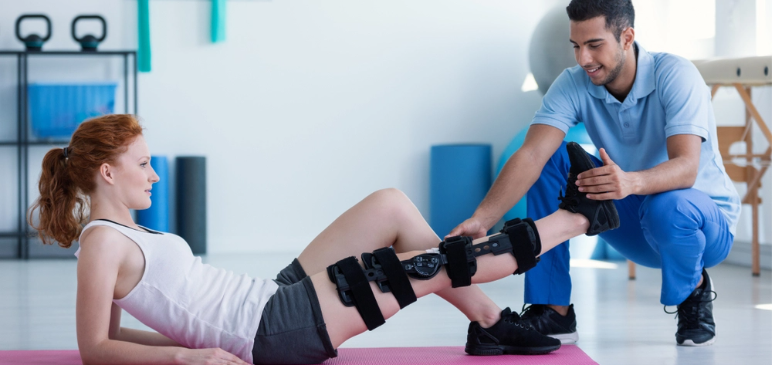
RSVP focuses on interdisciplinary rehabilitation, and applies the Continuum of Care principles by:
Continuum of Care is a guiding principle that shapes the approach of PCVRS in interdisciplinary rehabilitation. By seamlessly blending various rehabilitation services, and focusing on collaboration, PCVRS ensures that Participants receive not just treatment but a rehabilitation journey that helps them reach their goals.
The Rehabilitation Services and Vocational Assistance Program (RSVP) is focused on helping Veterans improve their health and adjust to life at home, in the community or at work.
Each Veteran’s transition to life after service is unique. Partners in Canadian Veterans Rehabilitation Services (PCVRS) works with RSVP participants to develop an individualized Rehabilitation Plan. This may include services to address medical, psycho-social, and vocational rehabilitation needs. A Rehabilitation Plan can include treatments focused on:
At PCVRS, our commitment to the well-being of Canadian Veterans goes beyond traditional approaches. We understand that each rehabilitation journey is unique. Therefore, we deliver a comprehensive Interdisciplinary Rehabilitation Program to address each Participant’s needs. Interdisciplinary teams aim to target all these areas to provide a holistic approach1. The interdisciplinary approach accounts for the Participant as a whole, including physical, psychological, and social well-being to help the Participant succeed.
Interdisciplinary rehabilitation care uses a team approach. Rehabilitation professionals from different disciplines work together to provide comprehensive care for a Participant. This approach to rehabilitation addresses the physical, emotional, and social needs of the Participant.
The rehabilitation team may include physiotherapists, occupational therapists, chiropractors, medical doctors, psychotherapists, and psychologists. What makes an interdisciplinary team unique is the continued communication between those involved. This allows professionals to collaborate and share strategies with the goal of helping Participants achieve optimal health and improving their quality of life.2
Regular communication and coordination among team members is pivotal. They share insights, assess progress, and adjust interventions based on individual needs. This collaborative approach ensures a well-rounded and integrated approach to rehabilitation. Their combined knowledge and skills maximize the effectiveness of interventions, promoting optimal recovery and enhancing the overall quality of life for the patient.
One of the key principles of an Interdisciplinary Rehabilitation approach is the continuum of care. Continuum of care emphasizes collaboration among professionals throughout the Participant’s rehabilitation journey, leading to improved outcomes and enhanced overall well-being. Research has shown that continuity requires cooperation at multiple levels, involving long-term and person-centered relationships.3
Rehabilitation is not a one-size-fits-all process, and progress may take time. RSVP spans various stages, providing seamless transitions and ongoing support to Veterans as they navigate their rehabilitation journey. Interdisciplinary collaboration ensures that all aspects of rehabilitation are seamlessly integrated for a comprehensive approach. As Veterans progress, we focus on community reintegration, offering support to help them regain independence in their daily lives.
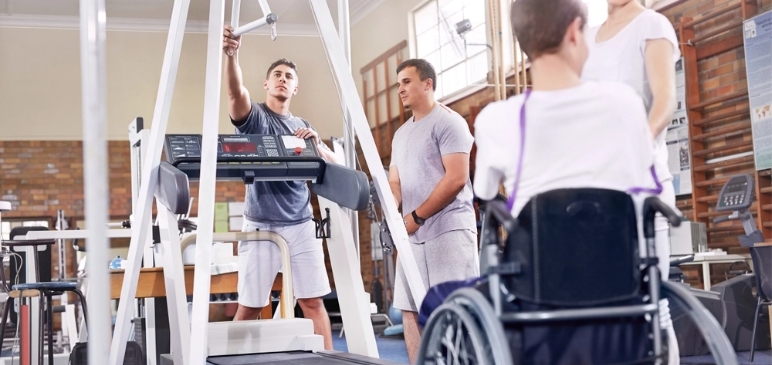
Now that we have introduced the concepts of interdisciplinary rehabilitation and continuum of care, and how they play a pivotal role in PCVRS’ delivery of rehabilitation services to RSVP participants, let’s review a case study:
Meet Christopher, a decorated Canadian Veteran who is a new Participant in the RSVP. Christopher was previously diagnosed with PTSD. He injured his leg while serving in the military, which worsened his PTSD symptoms.
Christopher was introduced to his interdisciplinary team in a preliminary meeting. This allowed each member of the team to conduct their relevant assessments. The assessment team recommended that an "Interdisciplinary Care" plan would be the best next step to address his on-going challenges.
Interdisciplinary care (IDC) is helpful when there is persistent pain, or a person has multiple needs. It’s especially helpful for people like Christopher, whose injury and pain have impacted more than just their body. Christopher’s Assessing IDC team includes a physician, occupational therapist, and psychologist.
Christopher already has his own family physician. The IDC physician does not replace his existing primary care physician. They play the vital role of consolidating and communicating care with any preexisting providers the Participant may have. During the initial assessment, the IDC physician noted that Christopher was diagnosed with PTSD. They were able to advise the rest of the IDC team by reviewing Christopher’s past medical history and establishing his diagnosis and prognosis. Guided by the physician’s medical expertise, Christopher’s assessing team can develop their rehabilitation plans to meet his goals.
Christopher and his team work together to create common goals. The team integrates and combines their skills and approach to attain the best possible outcomes. For example, Christopher’s physiotherapist will keep in mind his psycho-social rehab goals and concerns while completing his physio assessments.
Interdisciplinary care brings together the strengths of different clinicians to help Participants achieve their rehabilitation goals. This approach helps Participants like Christopher reach their rehabilitation goals and improve their quality of life. At PCVRS, we believe in empowering Canadian Veterans to rebuild their lives through our Participant-centered Interdisciplinary Rehabilitation Program. By embracing the principles of interdisciplinary care and providing a continuum of support, we aim to make a lasting impact on the well-being of Canadian Veterans. Together, with a dedicated team of rehabilitation professionals and a personalized approach to rehabilitation, we are committed to enhancing the lives of those who have served our nation.
1Singh R, Küçükdeveci AA, Grabljevec K, Gray A. The role of Interdisciplinary Teams in Physical and Rehabilitation Medicine. J Rehabil Med. 2018 Aug 22;50(8):673-678. doi: 10.2340/16501977-2364. PMID: 29944171.
2Singh R, Küçükdeveci AA, Grabljevec K, Gray A. The role of Interdisciplinary Teams in Physical and Rehabilitation Medicine. J Rehabil Med. 2018 Aug 22;50(8):673-678. doi: 10.2340/16501977-2364. PMID: 29944171.
3Ljungholm, L., Edin-Liljegren, A., Ekstedt, M., & Klinga, C. (2022). What is needed for continuity of care and how can we achieve it? – Perceptions among multiprofessionals on the chronic care trajectory. BMC Health Services Research. https://doi.org/10.1186/s12913-022-08023-0
As we enter a new phase in healthcare, rehabilitation services are changing to meet the specific needs of Canadian Veterans. Partners in Canadian Veterans Rehabilitation Services (PCVRS) is leading this transformation, using advanced technologies to improve the rehabilitation process. In this blog post, we will explore the importance of Virtual Care and how it can contribute to your rehabilitation.
Accessibility Beyond Boundaries
With virtual care, Veterans can access important rehabilitation support no matter where they live. Whether you're in a small town or big city, PCVRS uses online platforms to bring rehabilitation services right to you.
Personalized Rehabilitation Plans:
Every journey is unique, and PCVRS knows how important it is to create a rehabilitation plan that will fit individual needs. With your health care providers help, you might decide that virtual care is an option that works for you. Using online tools, you can benefit from personalized sessions that focus on your specific challenges, making the rehabilitation process more accessible.
Our virtual care platform seamlessly integrates vocational rehabilitation services, empowering individuals to reclaim their professional pursuits from the comfort of their own space. Whether navigating career transitions or seeking specialized guidance, our virtual care approach ensures personalized and effective support to enhance occupational well-being.
Enhanced Support:

Rehabilitation is not just physical; it also helps with career planning and mental and emotional well-being. Our virtual care platform includes vocational rehabilitation services and mental health support, as part of the rehabilitation process. Through online counseling, Veterans can address their vocational and mental health needs.
Safety and Comfort:
Virtual care focuses on keeping you safe and comfortable. By participating in virtual sessions, you can do rehabilitation activities right from your home, meaning less stress and time spent travelling or figuring out unfamiliar spaces. This helps create a relaxed experience and helps with better rehabilitation results.
Real-time Progress Tracking:
PCVRS uses advanced technology to monitor your progress in real-time. Virtual platforms make communication between Veterans and rehabilitation professionals easy, so changes to your rehabilitation plan can happen quickly if your needs change. This approach ensures that your rehabilitation journey is always on track.
Community Engagement:
PCVRS understands the importance of a team around the participant approach through the rehabilitation process and actively promotes teamwork using virtual care.
In the world of rehabilitation, adding virtual care is a game-changer. PCVRS is committed to using these innovative approaches to provide accessible, personalized, and comprehensive support to Veterans across the country. We hope you embrace the future of rehabilitation with PCVRS, where virtual services not only bridge gaps but also create a more connected, efficient, and successful rehabilitation process. Your path to recovery is evolving – let PCVRS help you succeed.
Canadian soldiers are used to facing challenges. But after releasing from the military, they can face new challenges they may not have encountered before. This is especially true for their mental health.
Partners in Canadian Veterans Rehabilitation Services (PCVRS) is dedicated to getting Veterans the mental health support they need. We are a leader in providing Veteran-centered, specialized care for mental health and well-being.
PCVRS is committed to providing tailored treatment and rehabilitation interventions that address your mental health needs. We aim to empower you. Our ''abilities'' focused approach emphasizes your strengths, rather than focusing on your limitations or challenges. This way, we help you develop coping strategies that build from your own skills and strengths. Here are some other key benefits of our approach that set PCVRS apart:
Holistic Approach:
We understand that mental health is complex. Our rehabilitation services encompass a holistic approach. We consider everything that affects your situation—psychological, social, emotional, and physical well-being—to help you succeed.
Experienced, Interdisciplinary Team:
Our team includes experienced mental health professionals, who work with other healthcare providers, like occupational therapists, social workers, and physicians. Our service providers are accredited professionals with the expertise to help you reach your goals.
Knowledge of Veteran Culture

Our clinicians are trained to understand military culture when working with Veterans. This, combined with their clinical expertise, ensures a supportive and understanding environment when seeking help. We respect and value the perspectives Veterans bring.
Navigating the world of mental health services can be daunting. At PCVRS, we strive to make the process seamless, compassionate, and tailored to the unique needs of each Veteran. Here’s what you can expect from us:
Comprehensive Assessment:
You will begin your rehabilitation journey with a comprehensive assessment. This step allows our professionals to understand your unique needs, challenges, and strengths. This lets us develop a personalized rehabilitation plan for you.
Specialized Programs:
We offer different types of support for mental health, social, and job rehabilitation. Your path depends on the level and complexity of your needs.
Collaborative Goal Setting:
You are an active participant in your rehabilitation. Through collaborative goal-setting sessions, we work with you to set achievable milestones and objectives. Your rehabilitation plan is built on what you want to achieve.
Evidence-Based Interventions:
We use proven, evidence-based methods to treat mental health issues. From traditional therapeutic approaches, to cutting-edge techniques, we tailor our interventions to get the best outcomes for you.
Partners in Canadian Veterans Rehabilitation Services (PCVRS) is your ally in the journey to better mental health. With a holistic approach, personalized programs, and a knowledgeable team ready to help you, PCVRS can provide the resources and support to reach your rehabilitation goals. In the face of mental health challenges, PCVRS is here to say, "You are not alone on your journey to healing."
If you need emergency help, please call 911, visit your local emergency department, or call the 988 Suicide Helpline.
For Canadian Veterans, transitioning from a life of service in the military to civilian work can sometimes be a daunting prospect. The familiarity of the military environment, its language, and its protocols can seem like a world apart from the requirements of the civilian job market. At Partners in Canadian Veterans Rehabilitation Services (PCVRS), we understand the challenges of this transition. Our mission is to support Canadian Veterans by helping them recognize and leverage their unique transferable skills for a successful transition to civilian employment.
Before diving into transferable skills, it's important to know the difference between hard and soft skills. Hard skills are specific technical skills acquired through training and experience. On the other hand, soft skills encompass the personal attributes and ways we deal with people that shape how we approach our work and interact with others.
These skills together form a comprehensive skill set that can be used effectively in a variety of professional settings. Recognizing a Veteran’s unique combination of hard and soft skills is key to unlocking the full potential of their professional capabilities in the civilian world.
The transition from military to civilian life is more than just a change in environment; it's a total shift in perspective. If Veterans believe their skill sets are specific to their military roles, they may overlook the wide array of transferable skills they can seamlessly apply to various civilian professions. These skills encompass leadership, discipline, problem-solving, adaptability, and teamwork, among others.
One of the most prominent transferable skills that Veterans possess is exceptional leadership. Whether it's leading military members or overseeing critical missions, Veterans understand the essence of effective leadership in challenging situations. This leadership experience is invaluable in various civilian roles, ranging from project management to executive positions.
The ability to work well with others in the military is a skill that seamlessly translates into the corporate world. The ability to collaborate, communicate, and work effectively in diverse teams is highly sought after by employers across various industries.
Military life often demands adaptability in dynamic and unpredictable environments. Veterans are well-versed in handling unforeseen challenges, making quick decisions, and adapting to rapidly changing situations. These skills are transferrable to roles that require quick thinking, strategic planning, and the ability to thrive in fast-paced environments.
Additionally, the ability to solve complex problems efficiently is another core competency instilled during military service. Whether it's devising tactical plans or mitigating risks in high-pressure situations, Veterans possess a unique problem-solving ability that is adaptable to civilian professions, such as logistics, engineering, or cybersecurity.
Kelly, the Infanteer:
Kelly, a recently retired Sergeant with 14 years of service in the Infantry, initially found the transition to civilian life overwhelming. However, by understanding her transferable skills, Kelly realized that her expertise in navigation and ability to work well in demanding weather conditions could be applied to roles in mail delivery or security. Furthermore, her leadership and quick decision-making skills opened possibilities for supervisory roles in various industries.
Sawyer, the Aviation Systems Technician:
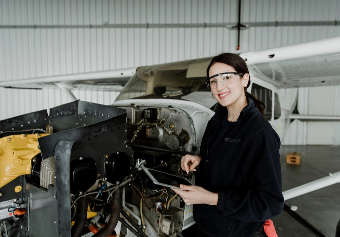
Corporal Sawyer's experience as an Aviation Systems Technician in the Air Force equipped them with specialized training and skills that extend beyond the military environment. Despite initial uncertainties, Sawyer found their technical expertise in electrical mechanics and maintenance is highly transferable to roles in avionics, heavy industrial machinery, and transportation equipment sectors.
Surbhi, the Training Development Officer:
Surbhi's twenty years of experience as a Training Development Officer at DND headquarters equipped her with a diverse skill set, including proficiency in policy and protocol writing, instructional software, and project management. Recognizing her strengths in research, instruction, and leadership, Surbhi explored various job avenues in the fields of education, government policy, and human resources.
Exploring Transferable Skills Through Real-life Examples:
At PCVRS, we know how important it is to give Veterans the necessary resources and support to help make their transition successful. Our Rehabilitation Service Specialists are committed to supporting Veterans as they find the civilian career that best fits their transferable skills and interests. Participants receiving vocational rehabilitation from PCVRS get assistance identifying the skills, training, job opportunities and other requirements needed to achieve their career goals. Visit the PCVRS website to learn how the Rehabilitation and Vocational Assistance Program supports Veterans in their post-military job search.
Embracing transferable skills is pivotal for Canadian Veterans embarking on a new chapter in their professional lives. By understanding the distinctions between hard and soft skills and recognizing their diverse skill sets, Veterans can confidently navigate the civilian job market and find fulfilling careers that value their unique expertise. PCVRS remains committed to supporting Veterans on this journey, providing them with the guidance and resources needed to thrive in their post-military endeavors.
In the world of healthcare, one truth remains constant: every Participant is unique, and so are their needs for rehabilitation and recovery. When it comes to addressing the diverse challenges faced by Participants in the PCVRS (Partners in Canadian Veterans Rehabilitation Services) program, a one-size-fits-all approach simply won't suffice. That's where the transformative concept of interdisciplinary rehabilitation steps in, offering a tailored and multi-level approach that has the potential to change lives.
Interdisciplinary rehabilitation care involves a team of rehabilitation professionals from different disciplines working together to provide comprehensive care for a Participant. This approach to rehabilitation is efficient due to its ability to provide care that addresses the physical, emotional, and social needs of a Participant. The rehabilitation team may include physicians, physical therapists, occupational therapists, and more. The goal of interdisciplinary rehabilitation care is to help Participants achieve optimal health and functioning and improve their quality of life. In this blog, we will discuss the benefits of interdisciplinary rehabilitation care and how it can help Participants recover faster and more effectively.
Our interdisciplinary approach:
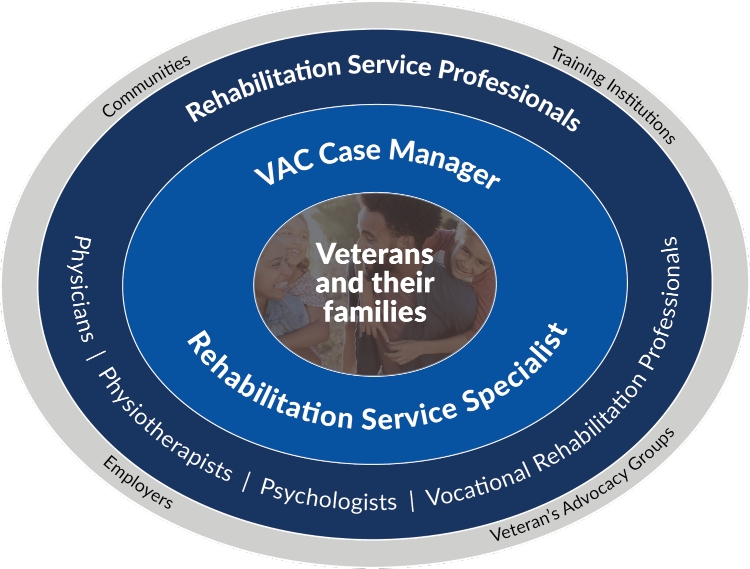
Now that we have introduced the concept of interdisciplinary rehabilitation and its pivotal role in the PCVRS program, let us dive deeper into its practical application through a real-life case study:
Meet Patrick, a PCVRS Participant who experiences the benefits of Interdisciplinary care (IDC). We'll closely examine how the collaborative efforts of healthcare professionals from various disciplines tailored a comprehensive care plan to meet his unique needs, helping Patrick reach his rehabilitation goals.
Patrick has chronic neck and shoulder pain after falling 3 years ago during active duty. Through conversations with his Veterans Affairs Canada Case Manager and PCVRS Rehabilitation Service Specialist, he was recently referred for and participated in a comprehensive, interdisciplinary assessment with a Physiotherapist, MD, and Psychologist. The assessment team recommended that an "Interdisciplinary Care" plan would be the best next step to address his on-going challenges.
IDC is helpful when there is persistent pain, a person has multiple issues, and especially for people like Patrick, whose injury and pain have impacted far more than just their body. IDC takes a team-around-the-Participant approach. The team begins with the patient and their support network and will be comprised of 2 or more diverse types of health professionals, commonly including a physiotherapist, occupational therapist, kinesiologist, psychologist, and a medical doctor. The greatest benefits of this type of care are that it offers a collaborative approach to treatment, leverages different skills of the clinicians toward achieving common goals, and empowers the patient to be an active and equal participant in their recovery journey. This can improve care, increase success of treatment, and help overcome barriers to recovery that may have previously felt overwhelming. IDC has become the gold standard in the treatment of people with persistent pain, mental health, and addiction.
Patrick and his team work together to create common goals. They integrate and meld their skills and approaches to attain the best possible outcomes. For example, Patrick’s psychologist may suggest an approach to accommodate his anxiety that is adopted by all team members, or the rehabilitation team may make modifications to their plans to reduce flare-ups caused by specific movements.
An interdisciplinary care approach to rehabilitation integrates the strengths of different clinicians to support a Participant’s achievement of their goals. Together, this can help Participants like Patrick progress towards greater freedom of movement, with less pain, and improve their quality of life.
Occupational therapists (OTs) work with people of all ages to overcome challenges that impact their ability to do the activities they want to do, need to do, or are expected to do in their daily lives. OTs play a vital role in the PCVRS (Partners in Canadian Veterans Rehabilitation Services) rehabilitation journey by helping you regain your independence and achieve your rehabilitation goals.
OTs can improve your health and well-being by helping you participate more fully in activities that are important to you. They will work with you to improve your life after service, helping address challenges at home, at work, or in the community; and improving your health and overall well-being.
They will help you identify activities that are meaningful to you, analyze them, and break them down into smaller tasks. This will make it easier for you to do them successfully.
OTs take a holistic view of your rehabilitation needs. They consider many factors, including physical and mental health barriers, that may impact your ability to participate in daily roles and responsibilities. They consider your:
Depending on the challenges they identify, OTs will work with you to:
Occupational Therapy treatment is focused on establishing routines and increasing participation in daily activities. It can help you reach your work or personal goals and become more independent.
OTs can help you in a number of ways. They can work with you to:
OTs commonly work in hospitals and health clinics, but they can also work in community mental health centers, physiotherapy clinics, home care, and health promotion . Occupational therapists can also work virtually, depending on the scope of treatment. They are important members of the interdisciplinary PCVRS team.
OTs define anything we do that occupies our time as an 'occupation,' so their work can touch on all aspects of our lives. That’s why working with an occupational therapist is so important! Schedule an appointment with an occupational therapist today and get back to doing all of the things you love in your daily life.
Getting the right care after an injury can make a big difference in your recovery. Physiotherapy can be an important part of your recovery plan, yet not everyone is familiar with it.
So, what is physiotherapy? Physiotherapy, also called physical therapy, is a healthcare service that takes a comprehensive approach to all aspects of physical health. It can help you:
Physiotherapists examine the mechanics of the body as a whole, including joint movement, strength, flexibility and overall well-being. When you work with a physiotherapist, they will conduct a comprehensive assessment to understand your individual strengths and needs. You will develop a customized treatment plan together, based on your health history, injury, lifestyle, and most importantly, your goals.
Physiotherapists use different techniques and tools to improve health and restore mobility. Some examples of physiotherapy include:

You and your physiotherapist will decide on the best techniques and tools to treat your condition and achieve your goals. Often, therapeutic exercise will be a component of a physiotherapy treatment plan. It’s been proven to play an important role in helping maintain or improve your condition between sessions with your physiotherapist.
Physiotherapists can help you recover from a range of injuries and conditions, the most common of which include:
Some physiotherapists also complete additional training and professional development in specialty areas of physiotherapy such as pelvic health physiotherapy, vestibular rehabilitation for dizziness and balance conditions, concussion care and recovery, and cancer rehabilitation.
We offer virtual physiotherapy services if you can’t make it into a clinic. Whatever the reason, remote location, bad weather, or a transportation issue, you can still access physiotherapy services with a clinician. Connect with a physiotherapist remotely using video conference technology to receive in-province care wherever you are.
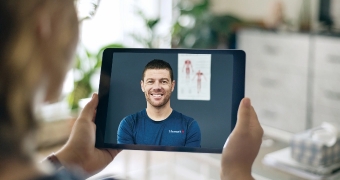
However, you choose to connect, your physiotherapist will be an invaluable member of your healthcare team, providing support and guidance every step of the way. Whether you are recovering from an injury or managing a chronic condition, your physiotherapist will work tirelessly to help you improve your quality of life and reach your full potential.
Schedule your appointment with a physiotherapist today and discover the benefits of a healthier, more active life.
General Program Information
About the Rehabilitation ProgramRehabilitation teamRehabilitation journeyGBA PlusFAQFor Businesses
Hiring a VeteranPartners in Canadian Veterans Rehabilitation Services
Rehabilitation Services and Vocational Assistance Program
